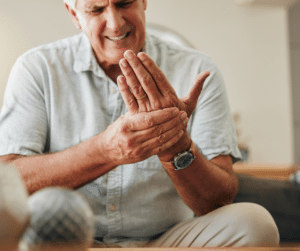Signs of Arthritis in Seniors
 If your senior parent seems to be moving slower and having more pain than usual in their joints, it may be due to normal aging or arthritis. Most seniors assume that their pain is just a product of aging. But if it’s because they have arthritis there may be medications or treatments that can help reduce the amount of pain your senior parent is living with.
If your senior parent seems to be moving slower and having more pain than usual in their joints, it may be due to normal aging or arthritis. Most seniors assume that their pain is just a product of aging. But if it’s because they have arthritis there may be medications or treatments that can help reduce the amount of pain your senior parent is living with.
Arthritis is something that impacts more than half of all seniors. Seniors who have had previous injuries from accidents, sports, or falls have a much higher risk of developing arthritis. If your senior parent is having trouble living independently because of the pain they’re experiencing elder care can help. Elder care helps seniors with everything from household chores to cooking and managing their medications.
If your senior parent is showing any of these common signs of arthritis in seniors you should make a medical appointment and have them screened for arthritis. They may not have to live with the aches and pains they are struggling with now.
Joint Pain and Stiffness
The most common symptom of arthritis in seniors is pain and stiffness. Seniors who experience pain and stiffness after being sedentary for a while, like when they get up in the morning, may have arthritis.
Limited Range of Motion
Arthritis can lead to a decreased range of motion in the affected joints. Seniors may find it challenging to move certain body parts freely. Movements that used to be easy for your senior parent like swinging a tennis racket, walking, or riding a bike can become very painful for seniors with arthritis. If your senior parent can no longer do the activities they used to enjoy without pain get them screened for arthritis.
Swelling and Redness
Inflamed joints may appear swollen and feel warm to the touch. The swelling is often accompanied by redness, indicating increased blood flow to the affected area. Sometimes swelling is caused by side effects from medication or other causes, but if the joint area is warm and looks red that should be checked by a doctor.
Joint Deformities
In some cases, arthritis can cause changes in joint structure which makes joins look strange or deformed. For instance, seniors with arthritis in their hands may notice their fingers are becoming bent as the joints move out of alignment.
Fatigue and Weakness
Chronic pain and inflammation associated with arthritis can contribute to feelings of fatigue and weakness. Seniors with arthritis may experience a general lack of energy, impacting their ability to engage in daily activities.
Difficulty Grasping or Holding Objects
Arthritis affecting the hands and fingers may make it challenging for seniors to grasp or hold onto objects. Simple tasks like opening jars, turning doorknobs, or buttoning shirts can become more difficult due to joint pain and stiffness.
Painful Walking
Arthritis in weight-bearing joints, such as the knees or hips, can lead to pain during walking or other weight-bearing activities. Seniors may change how they walk or with uneven steps because of the pain. If your senior parent is having trouble walking normally or seems to be shuffling or in pain when they walk they should see a doctor.
Joint Cracking
Arthritic joints may produce a cracking or grating sound known as crepitus during movement. This audible indicator is often associated with the wearing down of cartilage within the joint. If your senior parent is experiencing this type of cracking often they need to be screened for arthritis.
If you or an aging loved one are considering Elder Care in Upper Darby, PA, please contact the caring staff at True Direct Home Health Care today at (215) 309-3119
- How Home Health Providers Offer Education Amidst Physical Health Changes - March 5, 2024
- Spring Activities for Seniors - February 21, 2024
- How to Help an Older Loved One with Cataracts? - February 6, 2024
